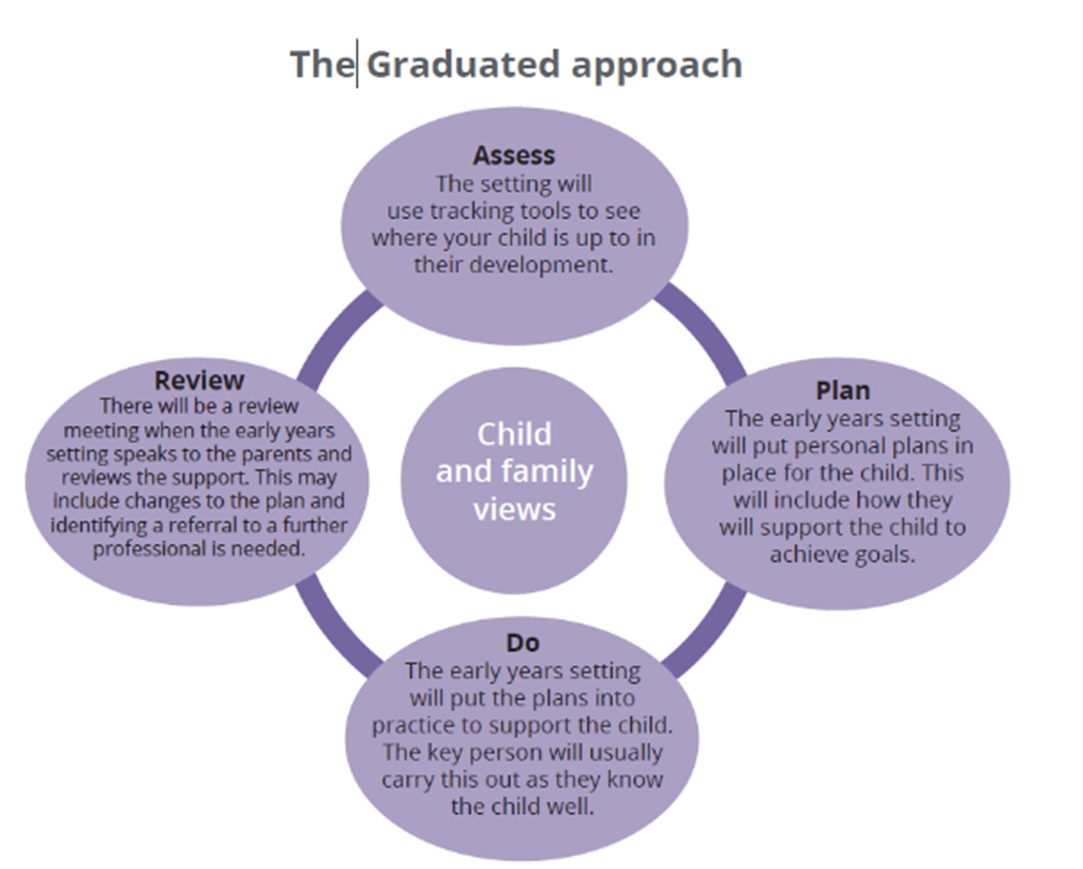All early years settings should deliver high quality teaching – this is identified in a document called the ‘Graduated approach descriptor’, settings may also know this as the ‘Ordinarily available’. This documents lists various strategies and documents that they can use to support children within the setting, for each area of a child’s development. Please visit the My Early Years Services website for the full document. https://www.myearlyyearsservices.co.uk/Page/12533
If the early years setting identifies your child may need additional support, they should discuss their concerns and gain information from yourself. From this they will put personal plans in place for your child, this is a document that will have individual targets on for your child. They should complete this with yourselves and share a copy so that you can also do these at home. This promotes partnership and consistency for the child. The setting will review the personal plans with yourself, so that they can see if the child has met their outcomes, or further support is needed.
Early help assessments
A professional supporting may offer to complete an early help assessment in partnership with yourself. The purpose of the assessment is to gain information from yourself around your child and family and identify if further support may be needed. Parent/family views are key throughout this assessment and when completed there will be a team around the family meeting. You will be asked who you would like to attend and it is a chance for everyone to sit down together and
look at how they can best support. The professional may also discuss a referral to other services, who may be able to offer support. Visit warrington.gov.uk/early-help for more information.
2-2.5 developmental review
Between the ages of two and three years old, if a child is attending an early year’s setting their key person will review their progress and share the information with parents. This can also be completed in partnership with your child’s health visitor. The review will focus on 3 main areas – Communication and language, physical development and personal, social and emotional development.
Child development centre (CDC)
A referral can also be made to the Child development centre (CDC) by using an ‘Under 4 complex case referral’, or the Neurodevelopmental pathway. Any professionals working with the child e.g. health visitor, or the early years setting can make the referral, if they have identified a delay and feel the child would benefit from further support.
Inclusion panel
Local authorities must ensure that all early years settings delivering funded early education places meet the needs of children with Special Educational Needs, and disabled children (SEND). In order to do this, we need to make sure that funding arrangements for early education reflect the need to provide suitable support for these children.
The inclusion funding panel consists of a range of professionals, including Health and the Local Authority. Early years settings are welcome to send a referral into the inclusion panel for the following:
- Early years settings can apply for funding for any child with a developmental delay/SEND, who is accessing their early years entitlement. They would need to have followed the Graduated Approach, attach evidence to support why they need the funding and how it will improve outcomes for the child. Funding is usually awarded for resources or small group work.
- Early year’s settings are welcome to apply for support from a SEND outreach worker who will come into the child’s setting, observe the child and share strategies to support their development.
- For some children it may be clear from an early age they may need additional support, or already have a developmental delay. If so, a health professional will send a Health Notification to the panel. Health services have a duty to provide this information to the local authority, this is to ensure support can be put into place for the child, for example Early years SEND support.
Disability access fund (DAF)
All children will be eligible for the Disability Access Fund (DAF) if they are attending an early years setting that provides the free early education entitlement, and meet a criteria (child is in receipt of Disability living allowance DLA). The Disability access fund of £ 910 is payable as a lump sum once a year, per eligible child. It aids access to early year’s places by supporting providers, in making reasonable adjustments to their settings.
Early Years Pupil Premium (EYPP)
Early Years Pupil Premium (EYPP) is an additional sum of money paid to childcare providers, for children of families in receipt of certain benefits. This funding will be used to enhance the quality of their early years’ experience by improving the teaching, learning, facilities and resources, with the aim of impacting positively on your child’s progress and development.
Sandy Lane specialist nursery provision
Sandy Lane maintained nursery school has specialist provision for children with complex additional needs. Admission to this provision known as the Rainbow room is made via a provision panel, with a variety of professionals similar to the inclusion panel. Please note if a child is attending the specialist provision for their full early years entitlement and attending another early years setting for additional hours, they will not be able to access the early year’s special educational need and disability inclusion funding.
Transition
Transitions are the big and small changes that take place throughout life. One main transition, for both the child and the parent is the transition from an early years setting to primary school. The child will have an opportunity to meet new people and have new experiences. The setting will work in partnership with parents and other professionals, to ensure the transition to school is as smooth as possible. The setting may access training from the Local Authority around this, if they would like further support.
Appeals and complaints
If a parent has a disagreement on an inclusion panel decision they should speak to their early years setting. If the early years setting does not agree with the outcome, they are able to appeal the decision within 14 working days by email to:
sendearlyyears@warrington.gov.uk
We would encourage all parents to speak to their child’s early years settings in the first instance and if necessary follow their complaints policy (all early years providers must have a complaint policy and these should be available for you to request a copy).
For further information please contact:
sendsupportearlyyears@warrington.gov.uk

